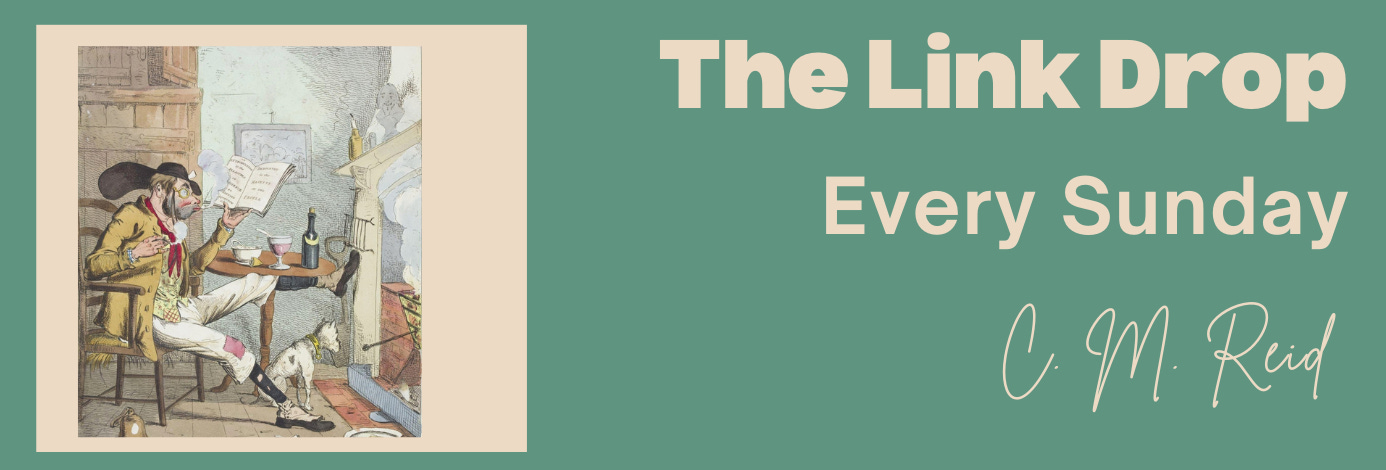Thanks to everyone who has recently subscribed to The Link Drop. If you enjoy this free publication, consider supporting my work through the ‘Buy Me A Coffee’ button. A small amount goes a long way in supporting my writing.
I also publish SubStack’s The Ink-Stained Desk, a corner of the internet dedicated to all things reading, writing, and the transformative power of story. Regular features are Genre Genaology, Book Reviews, and Original Fiction. If this sounds like it might add value to your week, head over and take a look around.
Welcome to the tenth edition of The Link Drop,
This week we are considering the parallels between cult leaders and crime novelists, em dash history (—yes it existed before generative AI and some of us use it extensively!) and a reminder that your art supplies are not sacred!
The Art of Doing Nothing, The Craft of Making it Hurt.
By Katia Lief.
Cult leaders and crime novelists have something in common: knowing how to expertly leverage suspense to engage individuals, whether that be a reader or a follower.
Why the notorious em dash is more than just a ChatGPT trademark.
by Sonal Gupta.
The em dash’s rich usage and history, giving this very versitile punctuation mark space apart from recent controversial association with AI-generated text.
If people stopped having babies, how long would it be before humans were all gone?
By Sean Gallup.
While current trends show a slowing but still growing population, the author, an anthropologist, explores the hypothetical scenario of human extinction if birth rates plummeted, highlighting how society would quickly crumble due to a lack of young people for essential work.
JSTOR Readings This Week
Get your free JSTOR accounts at the ready! (No, this is not sponsored. I’m just so grateful to be able to read 100 academic articles a month for free and want to shout it from the rooftops!)
‘Sherlock Holmes Meets Dracula.’
By Daniel Cottom
In ELH, vol. 79, no. 3, 2012, pp. 537–67
Ever thought to draw parallels between Dracula and Sherlock Holmes? Cottom argues that Sherlock Holmes, despite upholding law, is essentially a "perverse" bohemian akin to Oscar Wilde's Dorian Gray, and Bram Stoker’s Dracula, finding gratification in crime itself rather than justice.
By C. Jefferson Weber.
In The North American Review, vol. 207, no. 746, 1918.
This was an interesting article that had me nodding to some very good arguments, and then I noted that it was written over 100 years ago and wondered what has changed since then. Weber argues that while written English remains mutually intelligible, spoken American and British English are diverging, potentially leading to future communication difficulties due to differences in vocabulary and pronunciation.
What I Enjoyed On Substack This Week.
Copyright, Piracy, Tariffs, and... Patriotism?
By Anne Trubek.
A short history of American publishing and copyrights.
Desacralize your art supplies (for gods' sake).
By Sarah Hoenicke Flores.
A timely reminder for me (—who is in the habit of hoarding my art and stationery supplies like Gollum.)
why time felt slower when we were kids (and how to get it back).
By Yana Yuhai.
In direct response to the ‘nostaliacore’ trend.
And that’s The Link Drop for this week, I hope you found something to hold your interest this week.
Don’t forget to check out my other publication, The Ink-Stained Desk, for book and genre deep dives.
Have a wonderful week!
C M Reid at The Link Drop.





